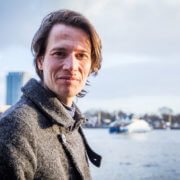Imagenary Field of Wood
Elmo Vermijs | TrainCamp Project
Elmo Vermijs | TrainCamp Project
‘We have broken the great conversation. We are talking only to ourselves. We are not talking to the rivers, we are not listening to the wind and stars.’
Thomas Berry (philosopher – ecologist)
In my journey I will focus on the voice of the forest in relation to the societal transition.
In June I will undertake a journey by train, travelling from Amsterdam to the Green Culture Festival in Montenegro, one of the countries with the most percentage of forests in Europe (67% of the land). Along the way I will question passers-by, travellers and citizens about the relation they have with nature, and more specifically the forest, a trees and wood. This input will be used for a continuous workshop during the Green Culture Festival which centres around the question:
How do we restore the great conversation with nature?
The workshop is based on the principles of Homo Ludens by Johan Huizinga in which he states: “Men is in its essence a playing being, in order to play and develop culture it needs a set of rules”.
By walks in the forest, collecting material, having dialogues and by using imagination a surface with pieces of wood will be created with and by the participants. Elmo Vermijs will invite, facilitate and question participants in his search for:
How to restore the relationship with nature by using imagination?
The outcome in Montenegro will be an enormous Imaginary world of wood in which the visitor can wonder around and associate on new imaginary landscapes. The surface does not defines what it is, but questions the viewer how to relate to it.
The results will be used as input for the project StagingWood which investigates the lifecycles of wood, its different stages and its potential in the societal (green) transition. The project will be shown in the Netherlands at the Kleine Aarde, Boxtel where the same workshop will be held and questions will be discussed.
Architectural designer and educator Elmo Vermijs researches the relationship between space and regenerative production processes,
in order to generate new perspectives on the use of materials in contemporary society.
